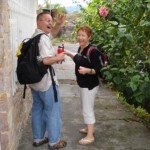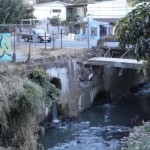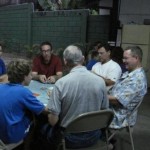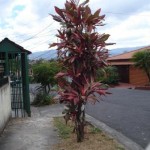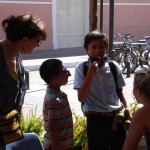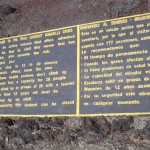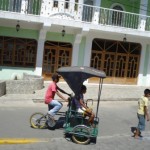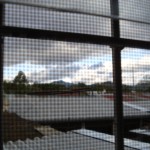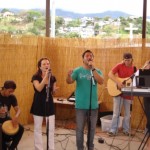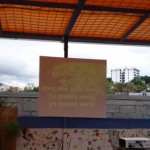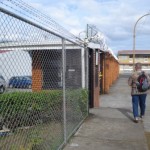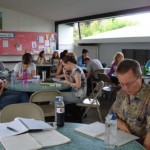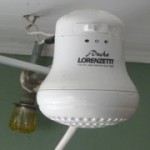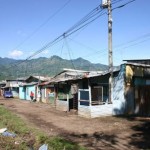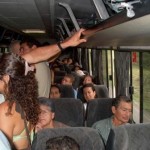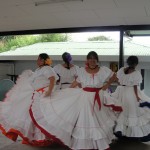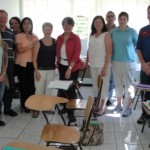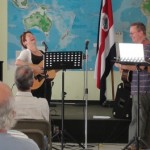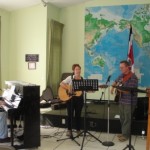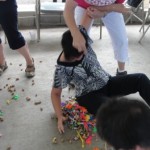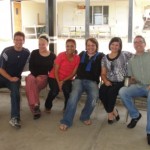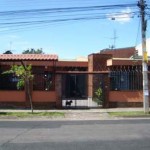A Day In The Life … Snapshots
I can do all this through him who gives me strength.We have captured some snapshots in time to share a little bit of our lives.We’ll share what our typical days look like and some photos.
This 2nd tri at Instituto de Lengua Española continues to be much harder for us than the 1st tri was, but we are also continuing to make progress. Our survival Spanish has certainly become better. We can get around, shop asking for help and where to find items items, order off a Spanish men, talk to the family we live with, give taxis directions to our house, catch the right bus, pray a little bit for people … and of course go to classes. For our friends who wonder how fluent we will be when we visit NH in December, we’ll see when the time comes. For now, we study hard. It will come … eventually. One other part of our learning is growing in our understanding of this culture and to a small extent, the culture of neighboring countries, so we’ve included pictures of a trip we took.
Following is a small example of something we’ve learned. Just for fun, we’ll imagine I have a headache (from all the work in Spanish!)
- So you want to say, “I have a headache.” You think, I’ll figure out those words and translate them word for word. You end up with something like: “Yo tengo un cabeza dolor.” Literally, “I have a head pain.” Pretty bad, but it gets the point across.
- So, you fix that to say, “Yo tengo dolor en mi cabeza.” “I have pain in my head.” Survival Spanish.
- Move on to “Tengo dolor en mi cabeza.” A little better – you don’t need “Yo” for “I,” because the form of the verb “Tengo” is the form you use for “I.”
- And now, “Me duele la cabeza.” Apparently, this is the better way. “Myself, hurts the head.” from an English standpoint.
It’s a slow, but GOOD process and we’re getting better step by step.
So … entonce – what does a typical day in our lives look like, this 2nd tri?
- The alarm goes off at 6 AM.
- We get ready for school, make our bed and eat breakfast with Mami at 6:45 AM
- We walk out the door around 7:10 AM and walk 1 km to school – Les carries his salveque, coffe and umbrella; I pull my salveque with umbrella (arthritis in my neck with a pinched nerve caused this change – doctor’s orders)
- Les and I are on a worship team that he is leading in chapel / capilla this tri. So, if it’s a Wednesday (practice for Thursday Chapel), he carries both guitars. I carry his coffee.
- 1st Class starts at 7:30 AM (Gramatica) with prayer in both our classes (en español por supuesto!)
- 5 minute break @ 8:20AM with long lines in the restrooms and /or a fast run to the the little cafe that sells coffee / snacks / refrescas, etc.
- 8:20 AM – 9:15 AM is the 2nd half of Gramatica
- Recreo (break) for 1 hour and 5 minutes – time to relax, work on homework, sometimes have worship team practice or on Tuesday’s and Thursday’s go to chapel – or go for additional tutoring. his tri, I will be doing that twice a week for at least a month to try to get on op of some difficult things and improve conversational skills
- 10:20 AM means Lenguaje – time to practice using what we’re working on in Gramatica, play games like Taboo or Bible Trivia (in Spanish or course!), pray in Spanish, review homework, ask and answer questions
- 11:10 AM and we get another 5 minute break and back to work for the rest of Lenguaje
- 12:05 PM and classes are finished
- Wednesdays you can add on an additional hour of practice for our worship team
- Either 12:05 or 1:00 we walk home 1 km for lunch, which we share with Mami, again practicing our Spanish skills, usually for about an hour
- Siesta! At least, that’s what we often do for about an hour. Sometimes, if we need snacks or additional school supplies or cash, instead we walk to Multiplaza del este – it’s about 1 or 1-1/2 miles; we do our shopping and return home
- Now we relax a little, maybe read a book and then start in on homework
- Homework – anywhere from 2-5 hours. Last week and the week before, we each had several nights with the 5 hour variety. At our age, this is a little bit grueling, but it’s what needs to be done.
- Somewhere around 6 PM, we are called to dinner with Mami and Papi and get to practice our Spanish communication skills again. Usually for about an hour
- A little reading / watching TV (in Spanish with CC in English or English with Spanish subtitles) or a downloaded episode of a show from home, but many nights we just don’t have time or are too tired
- Bed and dreams of conjugating verbs …
- Saturday are our day off and we try to do something fun. Last Saturday we went to see Thor in the Movies. Watched it in English with Spanish subtitles, only to discover that about halfway through the movie we had switched to reading the subtitles … comes with the territory! Your brain is constantly trying to grasp the language
- Sundays, we now alternate between La Vina del Este, where the Vineyard director for Central America is the Senior Pastor and … yup, it’s all in Spanish.
- 1st we tak a bus to San Pedro and then we wait and catch a 2nd bus to church – takes anywhere from 1 to 1-1/2 hours.
- We worship with Spanish songs, (often familiar English songs translated into Spanish and listen to a message in Spanish, (typically a bit longer than at home).
- The following Sunday, we catch a different bus into San Jose central, walk something like 18 blocks, wait and catch a 2nd bus to Viña Anonos. Here, we know more people and it feels more like home, with Rodney, Cindy, Julie, Steve, Tito, Eli and a host of other friends. Often there is a short term mission team from home, which means we worship in Spanish, but the message is in both English and Spanish
- We return home after either staying for lunch with Rodney and Cindy, with some uplifting fellowship time or catching lunch in San Pedro if we went to Del Este
- Siesta time
- And then we dig into homework (we might be conjugating verbs – sometimes 90, memorizing verbs, usually 42 based on pictures, translating a newspaper article and writing a summary of it in Spanish, or taking a passage of scripture and writing a Bible study).
- Bedtime – I’ve been known to crash at 8:30 PM or need to study until 11 PM; Les often studies until 10 PM or later
- Then we do it all again … a day in the life of Les & Di
- And we know, “I can do all this through him who gives me strength.” Phil 4:13TNIV
Please enjoy the pictures and the above schedule for a taste of “A day in the life of Les and Di.”

- Heading off to school during the 1st tri
- Les is standing next to what you put your trash in
- The river we walk over all the time, at the end of our block.
- Game Night at School on the Terraza
- Quite the sign painting process
- Plant on the street we live on. Maybe Jon’s houseplant can grown this big!
- Dinner in Esterillos
- Friends on Lake Nicaragua. They are now in the Dominican Republic.
- Children begging in Nicaragua
- One last friendly message at Volcan Masaya
- Volcan Masaya – obnoxious fumes and all. Impressive though!
- Volcan Masaya – active Volcano we visited in Nicaragua
- Frequent form of transportation in Granada Nicaragua
- Yup – It’s a Volcano! A common view in Costa Rica & Nicragua
- 1 of MANY Iguanas Outside Our Motel in Esterillos
- Lluvia! Rain Rolling in – Looking outside our office window
- Viña Anonos Worship Team Sunday Morning
- Viña Anonos Words for Worship Sunday Morning
- Les walking up to the guard shack to enter school (there’s one one most streets)
- Students studying on the terraza during recreo
